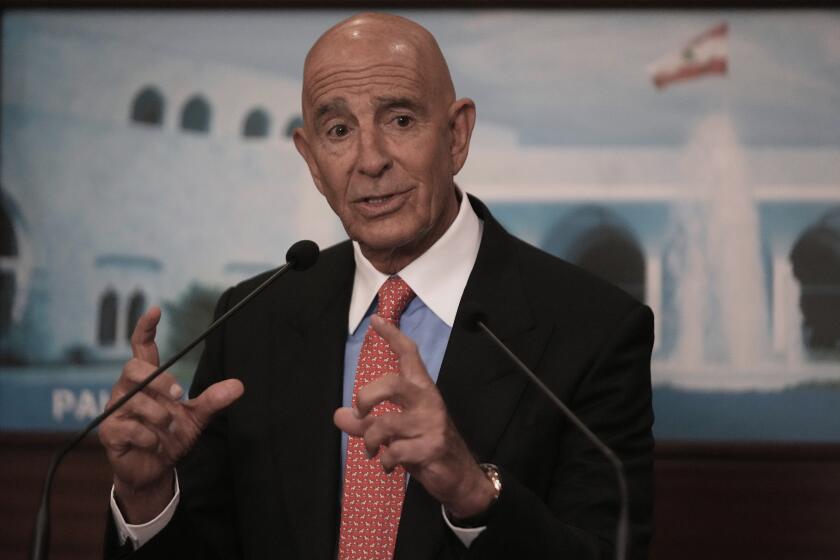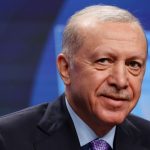Lebanon’s often-fractious press corps was united in anger this week over comments by Tom Barrack, the U.S. special envoy to Syria, who warned journalists against “animalistic” behavior and told them to “act civilized.”
Faced with a media scrum during a news conference held Tuesday in the Lebanese capital Beirut with a congressional delegation, Barrack strode to the podium and peremptorily told reporters they were “going to have a different set of rules.”
“The moment that this starts becoming chaotic — like animalistic — we’re gone,” he said. “You want to know what’s happening? Act civilized, act kind, act tolerant, because this is the problem with what’s happening in the region.”
Barrack is a real estate investor of Lebanese descent who, along with his Syria duties, serves as U.S. ambassador to Turkey.
It exposes a hollow, patronizing mentality that sees the Lebanese not as partners but as ‘rabble’ who must be disciplined
Diana Moukalled, Lebanese journalist
Barrack was accompanied by deputy envoy Morgan Ortagus, Sen. Lindsey Graham (R-S.C.), Sen. Jeanne Shaheen (D-N.H.) and Rep. Joe Wilson (R-S.C.) and is visiting Beirut to pressure the government into making real its plans to disarm Hezbollah, the Iran-backed Lebanese militant group.
The mood in the room wasn’t especially raucous, but apparently it wasn’t quiet enough for a clearly irritated Barrack, who said, “Do you think this is fun for us? Do you think this is economically beneficial for Morgan and I to be here, putting up with this insanity?”
One aim of the news conference was to announce that Israel had no plans to occupy Lebanon and that Saudi Arabia and Qatar were prepared to invest in an economic zone in south Lebanon to provide jobs to former Hezbollah fighters. But for many Lebanese, Barrack’s comments took center stage.
Reporters took to social media to excoriate Barrack for acting like a “19th-century colonial commissioner,” as one enraged journalist, Hala Jaber, put it.
“It exposes a hollow, patronizing mentality that sees the Lebanese not as partners but as ‘rabble’ who must be disciplined,” wrote Diana Moukalled, a Lebanese journalist who is a founding partner in local media outlet Daraj, adding that whoever wants to help Lebanon should first respect the press.
“Insults are not a negotiating tool,” Moukalled wrote. “We are not props for a diplomatic spectacle, and anyone who demands that Lebanon become a strong state must endure the questions of its press, regardless of their opinion of it.”
Read more: Saudi Arabia, Qatar to invest in Lebanon economic zone for disarmed Hezbollah, U.S. envoy says
Later Tuesday, the office of Lebanese President Joseph Aoun issued an oblique statement expressing “regret for the statements inadvertently made from its platform by one of its guests today,” while reaffirming its “full appreciation for all journalists.”
The union of journalists in Lebanon condemned Barrack’s remarks as reflecting “an ingrained colonial arrogance towards the peoples of the region.”
“We demand that Mr. Barrack issue an official and public apology for his actions toward the journalists, and we demand that the U.S. Embassy in Beirut take a position regarding these unacceptable actions with the media,” the statement said. It called for a boycott of news conferences involving Barrack until he apologized.
It wouldn’t be the first time 78-year-old Barrack has exhibited a less-than-rosy view of the region — in a July interview with the New York Times, he said the administration had “little patience for the region’s resistance to helping itself” — but the furor now comes at a delicate time for U.S. diplomacy in the region. Washington is pushing the Lebanese government to disarm Hezbollah, with the hope that Israel and Lebanon would normalize relations.
Hezbollah, which the U.S. designates a terrorist group, fought Israel after Hamas attacked on Oct. 7, 2023, in a war that escalated into a full-blown Israeli invasion of Lebanon late last year. After a ceasefire in November, Israel withdrew from most of southern Lebanon, save for five points on the Lebanese side of the border. Meanwhile, Israel has continued near-daily attacks, which the Israeli military says are needed to prevent Hezbollah from reconstituting its arsenal.
Read more: U.S. envoy doubles down on support for Syria’s government and criticizes Israel’s intervention
This month, the Lebanese cabinet tasked the army with making plans to disarm Hezbollah. The group denounced the cabinet’s decision, saying it won’t give up arms while Israel still occupies land and has not fully implemented November’s ceasefire agreement. Critics accuse the Lebanese government of being submissive to Washington — with Barrack’s tirade adding to their arguments.
“We strongly condemn the logic of American arrogance and its condescension towards our media professionals,” said Ibrahim Musawi, a Hezbollah-affiliated lawmaker who heads Parliament’s media and communications committee.
But he also reserved some anger for the Lebanese government, saying that this was another series in its “squandering of national sovereignty.”
Barrack has yet to comment.
This story originally appeared in Los Angeles Times.













